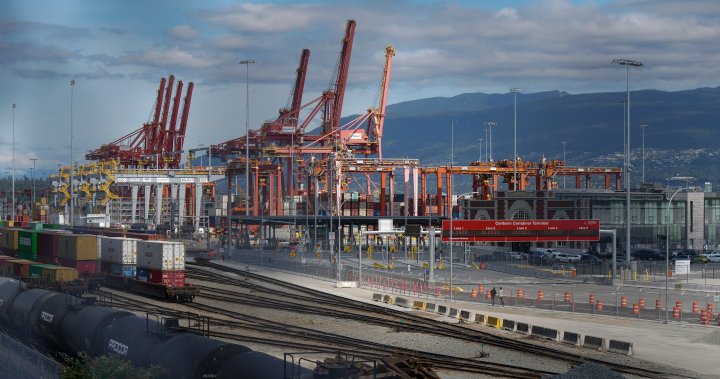Conservative Leader Pierre Poilievre is calling on Prime Minister Justin Trudeau to end a port workers strike in British Columbia “immediately.”
Roughly 7,400 port workers walked off the job again Tuesday after their union rejected an offer that briefly ended the strike last week.
That tentative agreement between the International Longshore and Warehouse Union Canada (ILWU) and the B.C. Maritime Employers Association (BCMEA) was proposed by a meditator who received direction from Ottawa to table the offer.
“Justin Trudeau must do his job and end this strike immediately because of the massive cost to workers, consumers and businesses,” he told reporters in Niagara Falls, Ont. on Wednesday.
“We’re calling on him to deliver a plan (and) end this strike within the next 24 hours.”

BCMEA said in a statement Tuesday that the ILWU’s internal caucus leadership rejected the “fair and comprehensive package” that was proposed by the mediator.
BCMEA said the proposed four-year collective agreement included “considerable hikes in wages and benefits” that exceeded the approximate 10 per cent increase over the past three years.
The proposed increases, it added, were also “generally above the established norm of recent private and public sector union settlements in British Columbia and Canada.”
In a statement, the ILWU said that with “the record profits that the BCMEA’s member companies have earned over the last few years, the employers have not addressed the cost-of-living issues that our workers have faced over the last couple of years as all workers have.”

In a statement Tuesday, Labour Minister Seamus O’Regan and Transport Minister Omar Alghabra shared frustration the agreement fell apart.
“We have been patient. Canadians have been patient. Every effort has been made. But this cannot go on,” O’Regan said.
Alghabra told reporters in Newfoundland Wednesday said while the government believes in the collective bargaining process, he was disappointed by the outcome and that Ottawa is now “exploring options.” He did not elaborate as to what those options were.
Poilievre blamed the strike’s resumption on Trudeau’s “total incompetence,” saying he caused the job action by “raising the cost of living.”
Stakeholders have been quick to call on Ottawa to step in.
“I don’t think the government has much choice now but to legislate them back, to be honest with you,” said John Corey, president of the Freight Management Association of Canada.

Workers were off the job from July 1 to 13, which cost roughly $10 billion in lost trade, the Greater Vancouver Board of Trade estimates. Shipments were halted in and out of about 30 ports in B.C., including Canada’s largest, the Port of Vancouver.
“Thirteen days was bad enough; it’s going to take until October to clear that through the supply chain. And if this goes back on, not only is it going to jam up the supply chain, it makes Canada look like a laughing stock,” Corey said.
In its own statement, the B.C. Chamber of Commerce said it was “profoundly disappointed” the union had rejected the deal.

Alberta Premier Danielle Smith, who has been vocal about the labour dispute since it began, posted to Twitter calling for the Liberal government to reconvene Parliament and legislate an end to the dispute.
The Canadian Federation of Independent Business also called calling on Ottawa Wednesday to pass back-to-work legislation to end the strike.
In 2021, the Tories supported the minority Liberals in passing back-to-work legislation to end a brief strike at the Port of Montreal that also restricted the flow of millions worth in goods.
— with files from Amy Judd
© 2023 Global News, a division of Corus Entertainment Inc.




